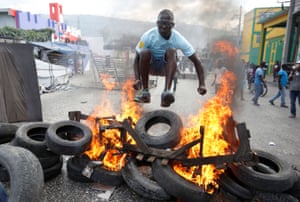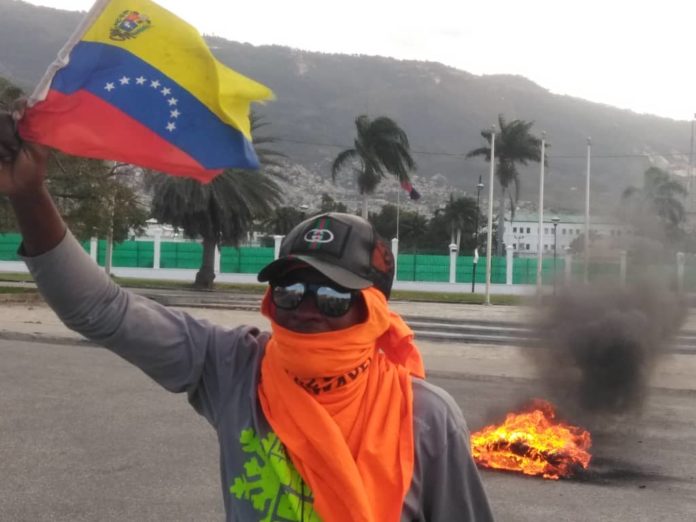Haiti in disarray as anti-government protests lead to prison breakout
Demonstrations over missing $4bn in development funds leave police overstretched, allowing 78 inmates to escape

Demonstrators flee police gunfire during protests in Port-au-Prince demanding the resignation of Jovenel Moise, the Haitian president. Photograph: Dieu Nalio Chery/AP
The impoverished Caribbean nation of Haiti, hit by days of violent demonstrations that have claimed four lives, has suffered a mass prison breakout after 78 inmates escaped while police were dealing with protesters.
The demonstrations, the culmination of months of anti-corruption protests over the fate of almost $4bn (£3.1bn) in missing funds earmarked for social development – delivered via a controversial deal for Venezuelan petrol – have swelled in recent days under the slogan: “Kot kòb Petrocaribe a?” (“Where’s the Petrocaribe money?”).
The protests have all but emptied streets normally clogged with traffic and pollution as schools, shops and municipal offices closed for fear of more violence. With at least four people dead, an air of uncertainty is hanging over the government of Jovenel Moise, with demonstrators demanding the president stand down.
Describing the escape from the prison in Aquin, a police official said the prisoners had initially left their cells for a scheduled shower but refused to return before fleeing when police were distracted by a nearby demonstration.
The discontent has been driven by a long-running scandal over the fate of money from a deal that first emerged in a government report in 2017, in which it was suggested large sums had been embezzled by officials during the course of the Petrocaribe deal.
Amid major protests in the centre of Port-au-Prince, a city that was devastated by the 2010 earthquake, protesters in the wealthy Pétion-Ville neighbourhood have blocked the road to Moise’s house and stoned his property.

A protester hurdles a burning barricade during a protest in Port-au-Prince, the Haitian capital. Photograph: Jeanty Junior Agustin/Reuters
The Petrocaribe deal has become a lightning rod for wider discontents that have bubbled under the surface since the January 2010 earthquake that killed more than 100,000 people.
Despite a large international aid effort, Haiti remains the Americas most impoverished country and was again hit by disaster in 2016, when Hurricane Matthew struck.
According to the World Bank, about 59% of Haiti’s population live below the national poverty line of $2.41 a day, while the estimated 24% living in extreme poverty on less than $1.23 a day now face rocketing inflation.
In this context, the Petrocaribe deal, signed before the earthquake, was sold as a possible solution to Haiti’s desperate finances.
Under the terms of the deal, signed in the middle of the last decade despite US efforts to prevent it, the Hugo Chávez government in Caracas sold Haiti heavily discounted oil as part of Venezuela’s efforts to win allies in the region, supposedly freeing up funds for much needed social development.
The arrangement offered Haiti fuel at a downpayment of just 60% of the purchase price, with the rest of the cost spread at very low terms of interest over 25 years. The deal led to Haiti building up billions in debt to Venezuela.
Because of Venezuela’s own political and economic crisis, which escalated under Chávez’s successor Nicolas Maduro, the deal began winding down last year even as it emerged that billions were unaccounted for, pushing Moise’s government to attempt to end fuel subsidies – a move reversed amid widespread discontent.
“What we are enduring today is because of Jovenel [Moise] … they are hungry,” said Joseph, whose stock of fish was totally depleted by looters during a recent demonstration. “We don’t have good leaders: if there was work in the country, this would never have happened.”
For his part, Moise has insisted on his commitment to rooting out corruption. He tweeted last week that his government would investigate the alleged misuse of funds and hold all those responsible accountable. “No one will escape justice. It’s a moral and judicial duty,” he said.
Several investigations have failed to establish the fate of the Petrocaribe funds, beyond mismanagement including spending on abandoned construction projects.
Demonstrations over missing $4bn in development funds leave police overstretched, allowing 78 inmates to escape

Demonstrators flee police gunfire during protests in Port-au-Prince demanding the resignation of Jovenel Moise, the Haitian president. Photograph: Dieu Nalio Chery/AP
The impoverished Caribbean nation of Haiti, hit by days of violent demonstrations that have claimed four lives, has suffered a mass prison breakout after 78 inmates escaped while police were dealing with protesters.
The demonstrations, the culmination of months of anti-corruption protests over the fate of almost $4bn (£3.1bn) in missing funds earmarked for social development – delivered via a controversial deal for Venezuelan petrol – have swelled in recent days under the slogan: “Kot kòb Petrocaribe a?” (“Where’s the Petrocaribe money?”).
The protests have all but emptied streets normally clogged with traffic and pollution as schools, shops and municipal offices closed for fear of more violence. With at least four people dead, an air of uncertainty is hanging over the government of Jovenel Moise, with demonstrators demanding the president stand down.
Describing the escape from the prison in Aquin, a police official said the prisoners had initially left their cells for a scheduled shower but refused to return before fleeing when police were distracted by a nearby demonstration.
The discontent has been driven by a long-running scandal over the fate of money from a deal that first emerged in a government report in 2017, in which it was suggested large sums had been embezzled by officials during the course of the Petrocaribe deal.
Amid major protests in the centre of Port-au-Prince, a city that was devastated by the 2010 earthquake, protesters in the wealthy Pétion-Ville neighbourhood have blocked the road to Moise’s house and stoned his property.

A protester hurdles a burning barricade during a protest in Port-au-Prince, the Haitian capital. Photograph: Jeanty Junior Agustin/Reuters
The Petrocaribe deal has become a lightning rod for wider discontents that have bubbled under the surface since the January 2010 earthquake that killed more than 100,000 people.
Despite a large international aid effort, Haiti remains the Americas most impoverished country and was again hit by disaster in 2016, when Hurricane Matthew struck.
According to the World Bank, about 59% of Haiti’s population live below the national poverty line of $2.41 a day, while the estimated 24% living in extreme poverty on less than $1.23 a day now face rocketing inflation.
In this context, the Petrocaribe deal, signed before the earthquake, was sold as a possible solution to Haiti’s desperate finances.
Under the terms of the deal, signed in the middle of the last decade despite US efforts to prevent it, the Hugo Chávez government in Caracas sold Haiti heavily discounted oil as part of Venezuela’s efforts to win allies in the region, supposedly freeing up funds for much needed social development.
The arrangement offered Haiti fuel at a downpayment of just 60% of the purchase price, with the rest of the cost spread at very low terms of interest over 25 years. The deal led to Haiti building up billions in debt to Venezuela.
Because of Venezuela’s own political and economic crisis, which escalated under Chávez’s successor Nicolas Maduro, the deal began winding down last year even as it emerged that billions were unaccounted for, pushing Moise’s government to attempt to end fuel subsidies – a move reversed amid widespread discontent.
“What we are enduring today is because of Jovenel [Moise] … they are hungry,” said Joseph, whose stock of fish was totally depleted by looters during a recent demonstration. “We don’t have good leaders: if there was work in the country, this would never have happened.”
For his part, Moise has insisted on his commitment to rooting out corruption. He tweeted last week that his government would investigate the alleged misuse of funds and hold all those responsible accountable. “No one will escape justice. It’s a moral and judicial duty,” he said.
Several investigations have failed to establish the fate of the Petrocaribe funds, beyond mismanagement including spending on abandoned construction projects.

